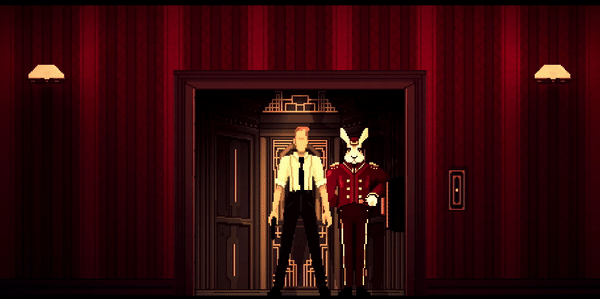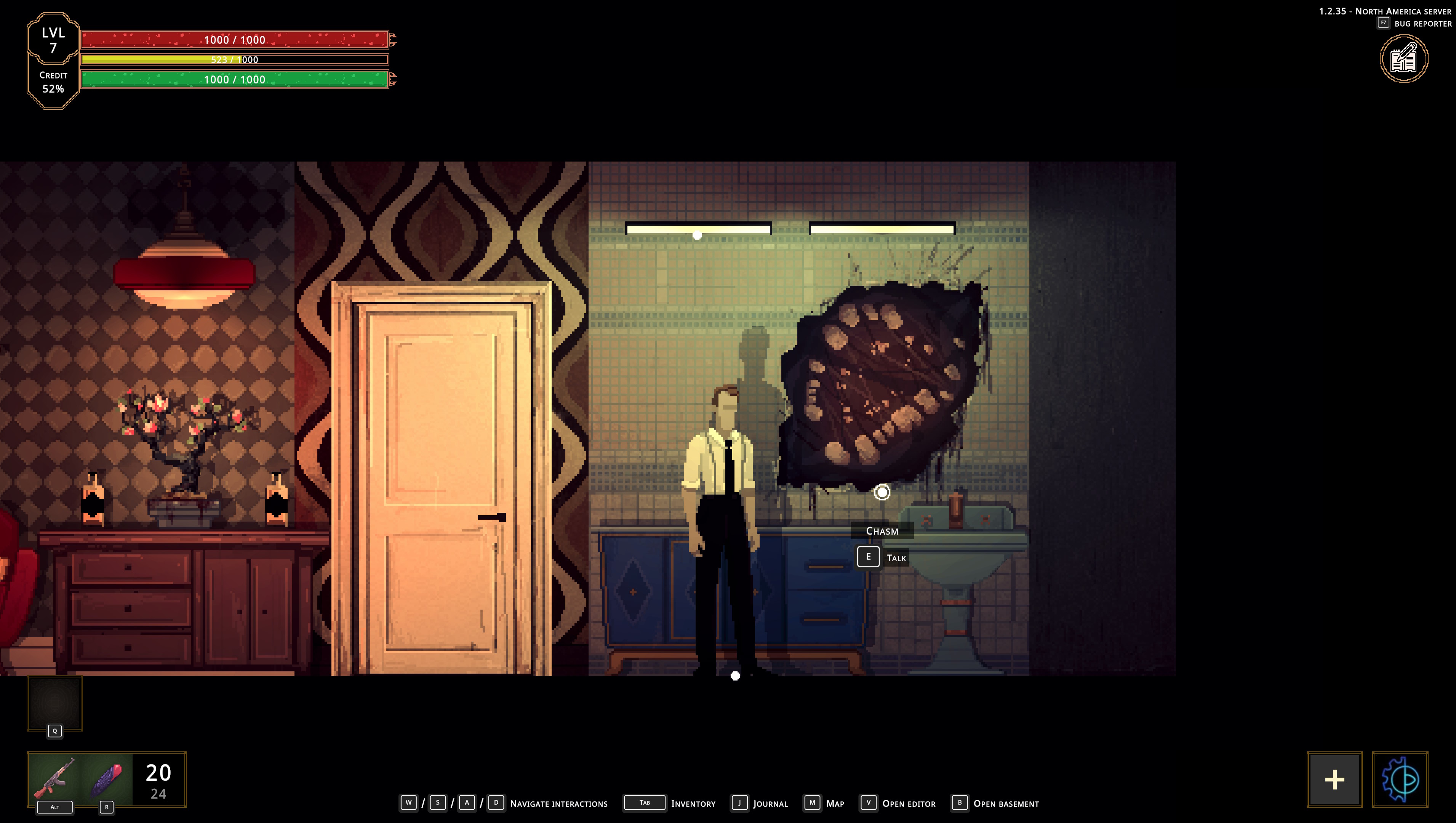I can't stop arguing with my bathroom wall in Hell is Others, a bizarre top-down extraction shooter
Hell is Others proved it to me: People suck, but the world is more fun when they're around


In addition to our main Game of the Year Awards 2022, each member of the PC Gamer team is shining a spotlight on a game they loved this year. We'll post new personal picks, alongside our main awards, throughout the rest of the month.
I was late to the party on Hell is Others, in part because I had no idea what to make of it. When I finally got around to giving it a go, not long after it launched in October, I still wasn't sure what to think: It's a top-down extraction shooter about a hard-bitten tough guy living in a ramshackle 1950s city, but the city is infested by vaguely insectoid monsters from another dimension, and there's a yawning chasm in your bathroom wall dispensing advice and prophetic caution. Not your usual noir yarn, to say the least.
It's definitely weird, and a tough nut to crack, too. There's very little in the way of gentle onboarding: You're mostly just thrown into the world and left to figure it out. That plays well to the game's deliberately obtuse fiction, but unfortunately much of that "figuring out" time is spent in the company of other players—many of whom, as the saying goes, do not wish you well. Developer Strelka Games dropped an update in November that, among other things, made changes to matchmaking to queue newbies and veterans separately, and that helped smooth things out—it's a lot easier to finish up the entry-level quests when you're not being mercilessly hunted by people already well-versed in the art of murder, after all.
You play Hell is Others as Adam Smithson, a "fixer" who lives in the eternal nighttime of Century City. The people of the city—the banker, the baker, the pharmacist, the gunsmith, and so on—need your help to complete particular tasks (mostly fetch quests) in exchange for useful rewards and the opportunity to trade with them in the future, for things like medical supplies and better weapons. Mechanically, it's pretty straightforward stuff: You descend to the city streets from your tiny apartment, search mostly-abandoned shops and buildings for equipment and loot, complete the jobs given to you, and call an elevator for a ride back up—easy peasy.
But the streets are crawling with otherdimensional creatures of all shapes and sizes, none of them friendly; worse, and far more dangerous, are the other Fixers in the streets with you. Those are the other players, and as the title suggests, they can make your in-game life miserable. Some want to be left alone to go about their business, but others are brutal killers, and when you meet up in the streets you've got just a split-second to decode each other's intentions: Usually, that means at least a few bullets are going to fly.
Matches in Hell is Others are brief. After descending to the city streets, you have 10 minutes to conduct your business and get back to an elevator that can return you home. If you miss your deadline, you're stuck—which means you're dead. But only a few elevators are running, scattered at random locations throughout the city, and they have to be called when they're switched on. Doing so makes a hell of a racket, alerting everyone nearby that someone is looking to get out, and as is the way with extraction shooters, that's when things can get really hairy. Summoning an elevator doesn't make it yours: Whoever gets inside and pushes the button when the door opens gets the ride up, and one of the most rewarding stunts you can pull—not in any gameplay terms, but just for the absolute rush—is to bull into the room at the last second, swipe someone's ride up, and leave 'em hanging.
(Another rewarding stunt: Calling an elevator and, instead of taking it up, leaving a landmine inside of it. Unless you happen to be the one who steps on the mine, of course, in which case it's less rewarding and more enraging, and yes that is also coming from experience.)

The top-down perspective of excursions into the streets gives Hell is Others a bit more of a tactical feeling than an FPS would. But it's still incredibly tense. You can hear (technically smell, but that's hard to convey in a videogame) other players when they're close, but are they simply passing by, or are you being stalked? Some powerups will temporarily mask your presence, enabling you to get closer to your prey without being detected (or more effectively hide, if that's how you roll), but others will enhance your senses, and so maybe you're not being quite as sneaky as you think.
Keep up to date with the most important stories and the best deals, as picked by the PC Gamer team.
Choice of weaponry is also vital: Right now I have an assault rifle that'll light up anyone who comes near me, but the damn thing also takes 10 seconds to reload—which, speaking from unpleasant experience, is more than enough time for an enemy with a sword to carve me up into little tiny pieces.
There are occasionally times when you need to hunt your fellow fixers, or at least will be rewarded for doing so, but one of my favorite things about Hell is Others is that for the most part, PvP combat is not essential: Bloodshed is always possible but very rarely necessary, and in fact I've only got one Fixer kill under my belt so far. And that works just fine for me, because it's not the action I enjoy nearly as much as the exploration and strangeness of Century City.

And it is deliciously strange. Hell is Others begins with a bonsai tree left at your door, and a note asking that you take care of it for 10 days in exchange for an unnamed reward. It has to be watered every day, but not with water—with blood.
The bonsai that drinks blood turns out to be one of the least-strange things in Hell is Others. That toothy abyss in your bathroom wall warns of a dark path ahead. The building superintendent, a rabbit, engages you in endless word games. You need to speak to management, but the elevator operator refuses to grant passage until your credit rating is high enough. Bullets are grown like plants. There are monsters living next door, and you might be one of them.
Altogether, it comes off as vaguely Lovecraftian, but it's really more Cronenberg than Cthulhu, in about a 50-50 mix with Raymond Chandler. I still have no idea what's going on, and it's quite possible that all of this dark, gloomy narrative might just be superficial window dressing—a Halloween Potemkin village that will fall apart the moment I look too closely behind the facade. But the more I play, the more I feel like I'm progressing toward something, and it's a lot of fun chasing that mystery.
The one big knock against Hell is Others right now is that very few people are playing it. A recent peak concurrent player count was just 21; its all-time high was 937. That's tough to turn around, especially for a multiplayer-focused game that relies on a healthy player base. It's still easy to get in and play, but encounters with other players feel much more rare than they were even a month ago. It's definitely less stressful, but the stress is kind of the point, isn't it? Hell is others, after all, and—just like in the real world—in spite of what a pain in the ass they are, it's a better place with them than without.

Andy has been gaming on PCs from the very beginning, starting as a youngster with text adventures and primitive action games on a cassette-based TRS80. From there he graduated to the glory days of Sierra Online adventures and Microprose sims, ran a local BBS, learned how to build PCs, and developed a longstanding love of RPGs, immersive sims, and shooters. He began writing videogame news in 2007 for The Escapist and somehow managed to avoid getting fired until 2014, when he joined the storied ranks of PC Gamer. He covers all aspects of the industry, from new game announcements and patch notes to legal disputes, Twitch beefs, esports, and Henry Cavill. Lots of Henry Cavill.


